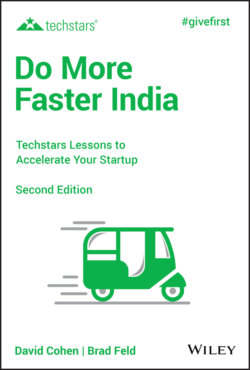Читать книгу Do More Faster India - Sacca Chris, Chris Sacca, Brad Feld - Страница 17
Chapter 2 Do or Do Not; There Is No Try
ОглавлениеBrad Feld
Brad is a partner at Foundry Group and one of the cofounders of Techstars.
When I grow up I want to be like Yoda (except for the short green part). Until then, I’ll just do my best to incorporate his philosophy into my life, summarized in the following:
$DO | ! $DO; try
Try: command not found
I’ve always found this Yoda quote to epitomize how I try to live my life. Ever since I was a little kid, I never really understood what “try” meant. There were lots of things I did and lots of things I failed at. However, even when I failed, I viewed myself as having “done it,” even if I wasn’t successful. When I wanted to master something, I did it a lot. I didn’t try to do it—I did it and accepted the failure along with the success.
Throughout the years I have heard many people say, “You should try this,” or “You should try that.” Sometimes it was trivial (for example, “You should try foie gras.”—yuck, I’m a vegetarian); other times, it was complex (“You should try to learn how to play the piano”). My parents taught me early on that “No” or “I’m not interested” was an acceptable answer to the “you should” directive, so I was rarely intimidated when faced with something new. I also started to understand the difference between preference (for example, try foie gras and see if you like it) and accomplishment (try to learn how to play the piano). I realized preference was unimportant in the context of accomplishment, but the inverse mattered—namely, that accomplishment was important in the context of preference. Specifically, you could accomplish a wide range of things whether you preferred them or not, but when you tried to accomplish that thing (playing the piano), it mattered a lot whether you preferred it. Prefer the guitar over the piano? You’ll probably never be accomplished at the piano.
Now, ponder the phrase “You should try entrepreneurship.” What exactly does that really mean? Then there’s “You should try to start a company.” Or “You should try to build a product.” Or even “You should try to sell something to someone.” Try? Really? If you prefer entrepreneurship, or think you have a preference for entrepreneurship, just go for it. You might fail—but that’s okay and is part of the process. If you start a company that ultimately fails, you are still an entrepreneur. And your next step should be to go start another company.
If you don’t have a preference for entrepreneurship (or—more specifically—entrepreneurship doesn’t interest you), you have no business creating a company in the first place. Starting a company is extremely difficult and requires commitment on many levels. Ultimately, you don’t really “try to start a company”—you either do it or you don’t.
Do or do not—there is no try.
